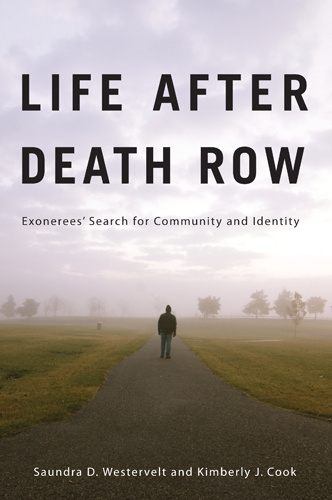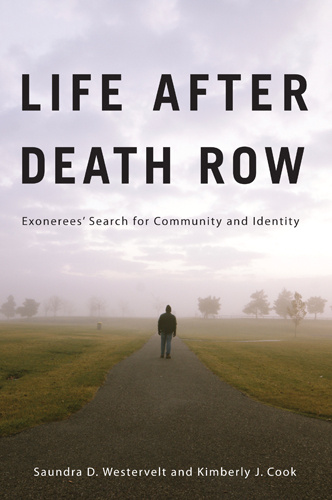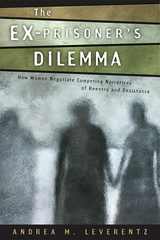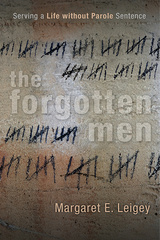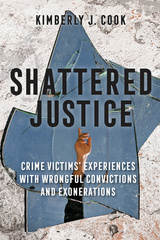Life after Death Row
Exonerees' Search for Community and Identity
Life after Death Row examines the post-incarceration struggles of individuals who have been wrongly convicted of capital crimes, sentenced to death, and subsequently exonerated.
Saundra D. Westervelt and Kimberly J. Cook present eighteen exonerees’ stories, focusing on three central areas: the invisibility of the innocent after release, the complicity of the justice system in that invisibility, and personal trauma management. Contrary to popular belief, exonerees are not automatically compensated by the state or provided adequate assistance in the transition to post-prison life. With no time and little support, many struggle to find homes, financial security, and community. They have limited or obsolete employment skills and difficulty managing such daily tasks as grocery shopping or banking. They struggle to regain independence, self-sufficiency, and identity.
Drawing upon research on trauma, recovery, coping, and stigma, the authors weave a nuanced fabric of grief, loss, resilience, hope, and meaning to provide the richest account to date of the struggles faced by people striving to reclaim their lives after years of wrongful incarceration.
This book provides a rich, detailed portrait of the lives of those who have been wrongfully convicted and sentenced to death in the United States. The authors skillfully conduct a journey inside the minds of exonerees, allowing readers to see the world from their unique perspectives.
When an innocent man walks off death row, we bask in the happiness that he and his supporters exude, but, as Westervelt and Cook movingly document in this outstanding scholarly treatise, exoneration never ends the despair that follows a wrongful death sentence.
A wonderful research idea, wonderfully realized. The persons we meet on these pages have suffered the cruelest fate imaginable, and we learn crucial lessons from them about human trauma and human resilience. A rich, thoughtful, important, compelling study.
Westervelt and Cook have written a well-written, compelling, and detailed qualitative study of the afterlife of death row inmates who have been exonerated by the courts. This study demonstrates the authors' extensive and thorough work, which has paid off with an important study in criminology. Highly recommended.
The nation's first systematic study of the experiences of death-row inmates who are cleared of wrongdoing.
This book provides a rich, detailed portrait of the lives of those who have been wrongfully convicted and sentenced to death in the United States. The authors skillfully conduct a journey inside the minds of exonerees, allowing readers to see the world from their unique perspectives.
When an innocent man walks off death row, we bask in the happiness that he and his supporters exude, but, as Westervelt and Cook movingly document in this outstanding scholarly treatise, exoneration never ends the despair that follows a wrongful death sentence.
A wonderful research idea, wonderfully realized. The persons we meet on these pages have suffered the cruelest fate imaginable, and we learn crucial lessons from them about human trauma and human resilience. A rich, thoughtful, important, compelling study.
Westervelt and Cook have written a well-written, compelling, and detailed qualitative study of the afterlife of death row inmates who have been exonerated by the courts. This study demonstrates the authors' extensive and thorough work, which has paid off with an important study in criminology. Highly recommended.
The nation's first systematic study of the experiences of death-row inmates who are cleared of wrongdoing.
SAUNDRA D. WESTERVELT is an associate professor of sociology at the University of North Carolina Greensboro. She is the coeditor of Wrongly Convicted: Perspectives on Failed Justice (Rutgers University Press).
KIMBERLY J. COOK is a professor and chair of the Department of Sociology and Criminology at the University of North Carolina Wilmington. She is the author of Divided Passions: Public Opinions on Abortion and the Death Penalty.
List of Tables and Figures
Preface
Part One
1 Living the Aftermath of a Wrongful Conviction
2 Researching the Innocent
3 Introducing Exonerees
Part Two
4 Facing Practical Problems
5 Managing Grief and Loss
6 Rebuilding Relationships
7 Negotiating Emotional Terrain
Part Three
8 Confronting Life on Death Row
9 Coping with Life after Death Row
10 Reclaiming Innocence
Part 4
11 Searching for Reintegration and Restoration
12 Moving Forward
Epilogue
Notes
References
Index

